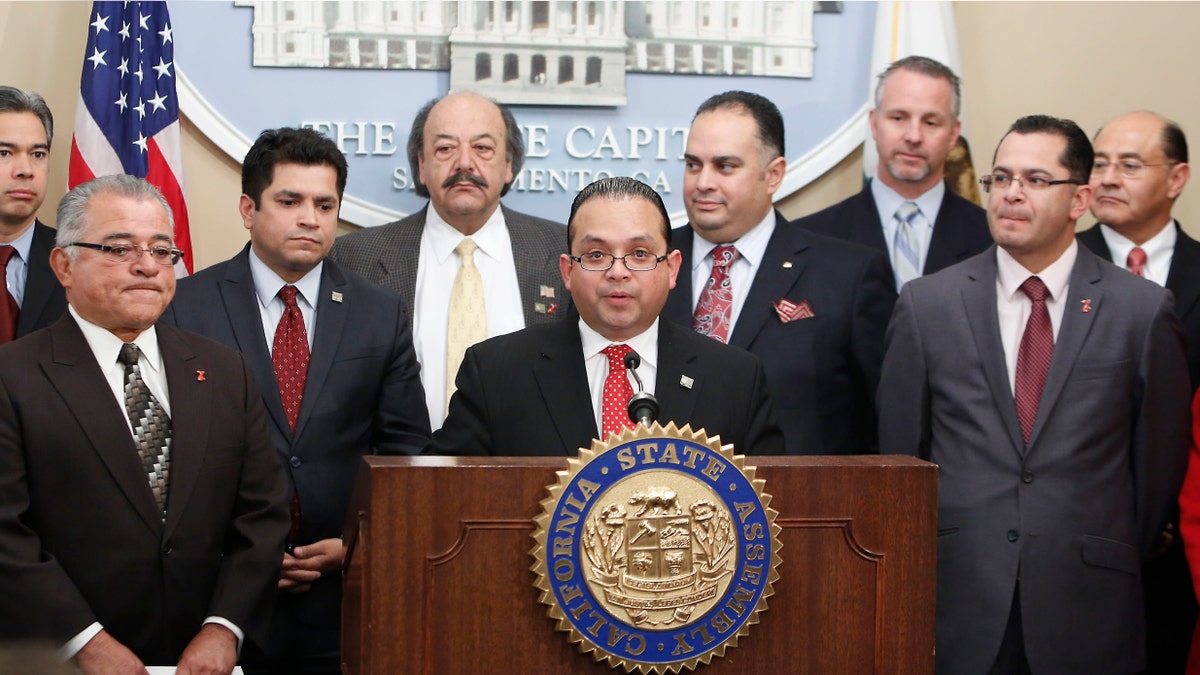
(AP Photo/Rich Pedroncelli)
How many Latinos are in Congress? Depends on whom you ask, actually – many may be surprised to learn that it's not easy to come up with a definitive answer.
There is no disputing this number in the Senate, which has three Latino senators. The House, however, is a whole other matter.
The House Press Gallery, an administrative office of Congress that helps media and House officials get the data and background they need, counts 33 Latino representatives in the 113th Congress, not including delegates. The Congressional Hispanic Caucus Institute, a nonprofit affiliated with the caucus, puts the number at 31. The National Association of Latino Elected and Appointed Officials tallies 28.
These conflicting numbers on Capitol Hill illustrate the difficulty overall in defining what it means to be Latino.
Latinos can be of any race, and some 18 million Latinos — or roughly 37 percent — used the "some other race" category on their 2010 census forms rather than identify as black, white or Asian. Because of that, the Census Bureau is considering making Latino a distinct category. On the 2010 form, the bureau asked whether or not people identify as Latino, and if the answer was yes, from which country of origin.
NALEO defines Latino or Hispanic as someone who can trace their ancestry to a Spanish-speaking country and identifies with that culture, said Arturo Vargas, NALEO's executive director.
The Congressional Hispanic Caucus Institute has no formal guidelines for compiling its list; it simply counts members who self-identify as Latino, including Portuguese, spokesman Scott Gunderson said.
The House Press Gallery, which keeps demographic data on House members, identifies as Latinos anyone whose linguistic origins come from Spain or Portugal. Press Gallery staff declined to discuss details about their list.
Trying to clear up the discrepancies, The Associated Press contacted the offices of each of the voting House members who appeared on one or two of the three lists. Delegates were excluded because they can't vote. The AP asked congressional staffers whether the members considered themselves Latino, how they identified themselves on the 2010 census and any details of their families' immigration stories.
In his opinion, Hispanic is too broad ... so he doesn't find a lot of use to the term.
Aides for Republican Reps. Trent Franks and John Garamendi told the AP that the lawmakers don't consider themselves Latino, although the House Press Gallery lists them as such.
Franks, a six-term congressman from Arizona, was on the Press Gallery's list of Latinos for this session and the 112th congressional session. But he is not on the list issued by the Congressional Hispanic Caucus Institute, which operates several young Latino development programs and holds events for Hispanic members of Congress. Nor is he on the list compiled by NALEO, a bipartisan group that works to increase the number of Latinos holding public office.
An aide said Franks has been a member of the Congressional Hispanic Conference, a House caucus of Republican Latinos, since he arrived in Congress in 2003.
"Trent Franks is not Hispanic, but considers the Hispanic community a critically important part of the pro-family, pro-freedom, conservative coalition in America," spokesman Ben Carnes said. He provided no details on Franks' racial or ethnic ancestry. Carnes noted that Franks' wife, Josephine, "is an immigrant and speaks the better part of four languages, one of which is Spanish."
Garamendi considers himself Basque, said Matthew Kravitz, deputy communications director. Garamendi made the House Press Gallery's list, but not the other two lists. Garamendi's paternal grandfather arrived in the U.S. in 1906 from the Basque region, a swatch of northern Spain and southern France. He did not check off Hispanic on the census, Kravitz said.
The Census' American Community Survey for 2011 estimates there are about 53,045 people of Basque origin in the U.S.
Along with Franks and Garamendi, three other House members account for differences in the tallies. Democratic Rep. Jim Costa, along with Republican Reps. David Valadao and Devin Nunes, all from California, are from families that emigrated from Portugal. They are not included in the NALEO tally, but the other two groups include them.
On his census form, Nunes checked "Hispanic, other" and wrote in "Portuguese" to specify his ethnicity, said Jack Langer, communications director. All of Nunes' grandparents are Portuguese immigrants, but Nunes has said the Hispanic label isn't specific enough to truly describe him, Langer said.
"He is not opposed to it if considered Hispanic. In his opinion, Hispanic is too broad ... so he doesn't find a lot of use to the term," Langer said.
Valadao's father emigrated from Portugal's Azores islands in 1969, and his mother in 1972, said Tal Eslick, Valadao's chief of staff. Valadao speaks English, Spanish and Portuguese and considers himself "an American with Portuguese heritage," Eslick said.
"He believes we are all better served by not dividing people into groups based on color of their skin or where their ancestors came from," Eslick said.
Costa considers himself Latino, communications director Jessica Kahanek said. "He definitely has that immigrant experience," she said, adding his parents spoke Portuguese at home and he didn't speak English until he got to grade school. She directed additional questions to the groups that compiled the lists.
An estimated 1.4 million people in the U.S. claim Portuguese ancestry, according to the Census' American Community Survey for 2011.
Based on reporting by the Associated Press.
Follow us on twitter.com/foxnewslatino
Like us at facebook.com/foxnewslatino












































